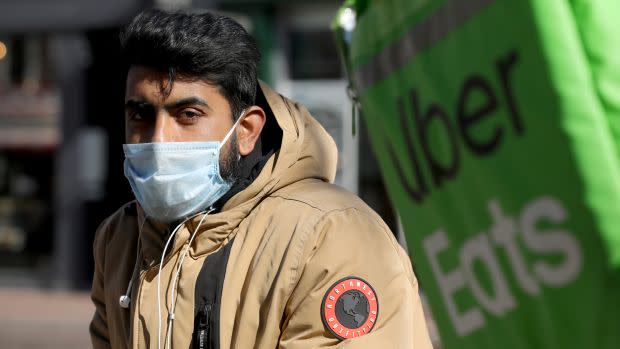Even as cities re-open, Uber is continuing to see demand for delivery

On Wednesday (May 5), Uber reported an all-time high in gross bookings driven by its delivery business. It was the first quarterly earnings call from its San Francisco headquarters since the pandemic hit the US last March.
Uber’s gross bookings grew 24% to $19.5 billion in the first quarter compared to the same period last year, despite bookings from mobility— its ride-hailing service—declining 38% to $6.8 billion. It was the delivery business, primarily UberEats, that continued to surge. Bookings increased 166% to $12.5 billion in the first quarter. The delivery business, which brought in $1.7 billion in the first quarter, brought in nearly double the revenue from mobility.
“We’re seeing encouraging signs of a continued use in our delivery business even as cities reopen,” said Nelson Chai, Uber’s chief financial officer.
He pointed to Sydney as an example. Chai said that dining had fully reopened in Australia’s most populous city more than two months ago, but delivery bookings continued to outpace mobility even after rides returned to pre-pandemic levels. A similar story may be playing out elsewhere. With New York City partially reopened, the demand for delivery also continued to expand, said Chai.
Uber has said it expects to reach profitability by end of year with the help of its delivery business, although the ride-hailing giant continues to lose money. In the first quarter, Uber’s total revenue declined 29% from $3.24 billion to $2.90 billion.
The growth in delivery
Even before the pandemic, Uber’s CEO had said that it sees Uber as more of a marketplace like Amazon. To realize this, it began an aggressive foray into delivery. In 2019, Uber acquired a majority stake in online grocery service Cornershop, to expand online grocery shopping in Latin America. Uber then went on a hiring spree during the pandemic acquiring delivery company Postmates and alcohol delivery company Drizly. This week, it announced a partnership with GoPuff, which specializes in convenience store-related items.
But the fast-growth of food delivery platforms has also raised increasing regulatory concerns. Last summer, Uber-Grubhub’s deal, which fell through in the end, raised antitrust concerns. Cities ranging from Jersey City to Los Angeles have placed caps on the commission fees that apps could charge. Andrew Yang, who is the front runner for the mayor of New York, has pledged to cap fees on food delivery platforms permanently.
To that point, Uber’s CEO Dara Khosrowshahi said during the call that the company’s ride-hailing experience and relationships with local government and regulators has prepared the company to have a “constructive dialogue” as it expands its delivery business. “So we welcome the dialogue,” he said.
Sign up for the Quartz Daily Brief, our free daily newsletter with the world’s most important and interesting news.
More stories from Quartz:
